
The Wellington Black team of Peter McKenzie (Scots College), Shakked Noy (Wellington High School) and Sarah Mackenzie (Kapiti College) successfully affirmed the motion “That socially progressive movements in democratic countries should seek social change through the courts rather than the legislature”.
Wellington were also the winners in 2014 and 2013.
“The final was a good debate on a highly topical issue,” says Josh Baxter, the President of the New Zealand Schools’ Debating Council, the organisers of the tournament.
“Wellington won over the five judges by arguing that minority rights are best protected by the court system, and are often put at risk through the tyranny of the majority.”
The final was the culmination of a weekend of debating between 36 of New Zealand’s top secondary school students at Victoria University of Wellington.
Teams from Wellington, Auckland, Canterbury, Otago-Southland, Hawke’s Bay, Northland, Central North Island, Waikato and Kahurangi-Marlborough took part in seven preliminary rounds of debates, confronting such issues as whether criminal trials should be televised, whether alternative medicine should be banned, and whether President Obama deserved the Nobel Peace Prize.
Students found out the topics and what side they were to argue only one hour before the debate.
Wellington and Auckland defeated another team from Auckland, and Central North Island, in the semi-finals.
The best five speakers at the tournament were named as members of the Russell McVeagh New Zealand Schools’ Debating Team, which will represent New Zealand at the World Schools’ Debating Champs in Singapore in July.
The team is Georgina Lomax-Sawyers (Buller High School) (Captain), Rhaz Solomon (Wanganui High School), Shakked Noy (Wellington High School), Peter McKenzie (Scots College) and Emily Williams (Columba College)
The Russell McVeagh New Zealand Schools’ Debating Championships have been held annually since 1988 and are recognised as the country’s most prestigious school debating competition. The championships are sponsored by Russell McVeagh.
The much-delayed English draft curriculum is now out for consultation, generating discussion from teachers.
Research from AUT demonstrates arts, culture and recreation have positive impacts on all aspects of…
How effective has the school phone ban been in achieving its aims? Researchers from the…
School camps and excursions deliver hands on learning experiences, helping to consolidate classroom learning.
Innovations in AV technologies present new opportunities to engage with students. We look at how…
A new report from the University of Auckland’s Our Voices Project asks young people what…
This website uses cookies.